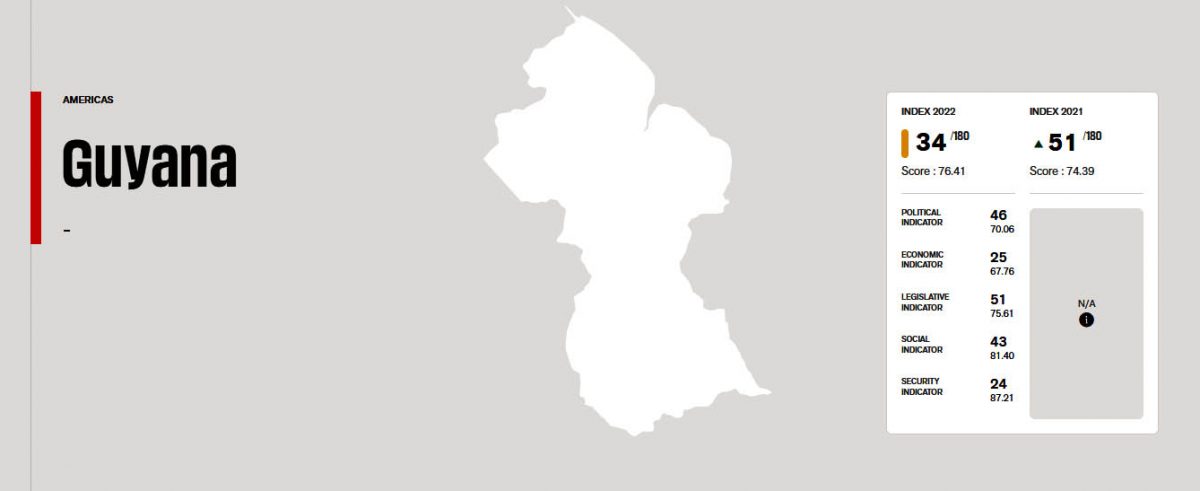Guyana has moved up 17 spots in the press freedom rankings moving to 34 out of the 180 countries listed on the 2022 World Press Freedom Index which was compiled by Reporters without Borders (RSF).
The report which assesses the state of journalism in 180 countries and territories, highlights the disastrous effects of news and information chaos – the effects of a globalised and unregulated online information space that encourages fake news and propaganda. It was released earlier in the week.
According to the report, while Guyana protects freedom of speech and the right to information, journalists who oppose the authorities face intimidation. It noted that Guyana has a robust media landscape, with a diversity of national and regional media outlets.
Additionally, RSF said while there were attempts, in 2020, to improve regulation of the broadcast industry, the government failed to involve or consult with any broadcasters to strengthen the reform.
“Guyana’s journalists are respected and allowed to do their jobs freely and independently. They are generally well accepted and protected. While media professionals have faced legal intimidation and suspensions, they are rarely the target of physical acts or violence,” the report said.
RSF said that Guyana saw substantial improvement in the 2022 Index, thanks to its robust media landscape, as well as the fact that journalists generally operate in a safe environment without fear of violence or physical attacks.
In 2021, Guyana was ranked 51 which was a decline after three years of continuous improvement.
The RSF assessment stated that although Guyana’s constitution guarantees freedom of expression and the right to information, the laws are not always strictly enforced and public officials use defamation lawsuits to criticize the media. It added that the threat of legal harassment can be enough to discourage journalists from pursuing an investigation.
The report also highlighted that the economic viability of independent and opposition media outlets is threatened since they have to compete with the advertising revenues of pro-government media outlets and the state media.
In the Caribbean region, Trinidad and Tobago (25th) progressed rather significantly. This is mainly attributed to a Supreme Court ruling in favour of protecting journalists’ sources, which could hold far-reaching implications for media across the region.
Guyana’s latest ranking also puts it ahead of the United States (42nd), Australia (39th), Suriname (52nd), and Brazil (110th). Norway continues to occupy the top spot.
In its global analysis, RSF said “Within democratic societies, divisions are growing as a result of the spread of opinion media following the ‘Fox News model’ and the spread of disinformation circuits that are amplified by the way social media functions. At the international level, democracies are being weakened by the asymmetry between open societies and despotic regimes that control their media and online platforms while waging propaganda wars against democracies. Polarisation on these two levels is fuelling increased tension.”
The situation is classified as “very bad” in a record number of 28 countries in this year’s Index, while 12 countries, including Belarus (153rd) and Russia (155th), are on the Index’s red list (indicating “very bad” press freedom situations) on the map. The world’s 10 worst countries for press freedom include Myanmar (176th), where the February 2021 coup d’état set press freedom back by 10 years, as well as China, Turkmenistan (177th), Iran (178th), Eritrea (179th) and North Korea (180th).
RSF developed a new methodology to compile the 20th World Press Freedom Index.
The new methodology defines press freedom as “the effective possibility for journalists, as individuals and as groups, to select, produce and disseminate news and information in the public interest, independently from political, economic, legal and social interference, and without threats to their physical and mental safety.”
In order to reflect press freedom’s complexity, five new indicators are now used to compile the Index: the political context, legal framework, economic context, sociocultural context, and security.






